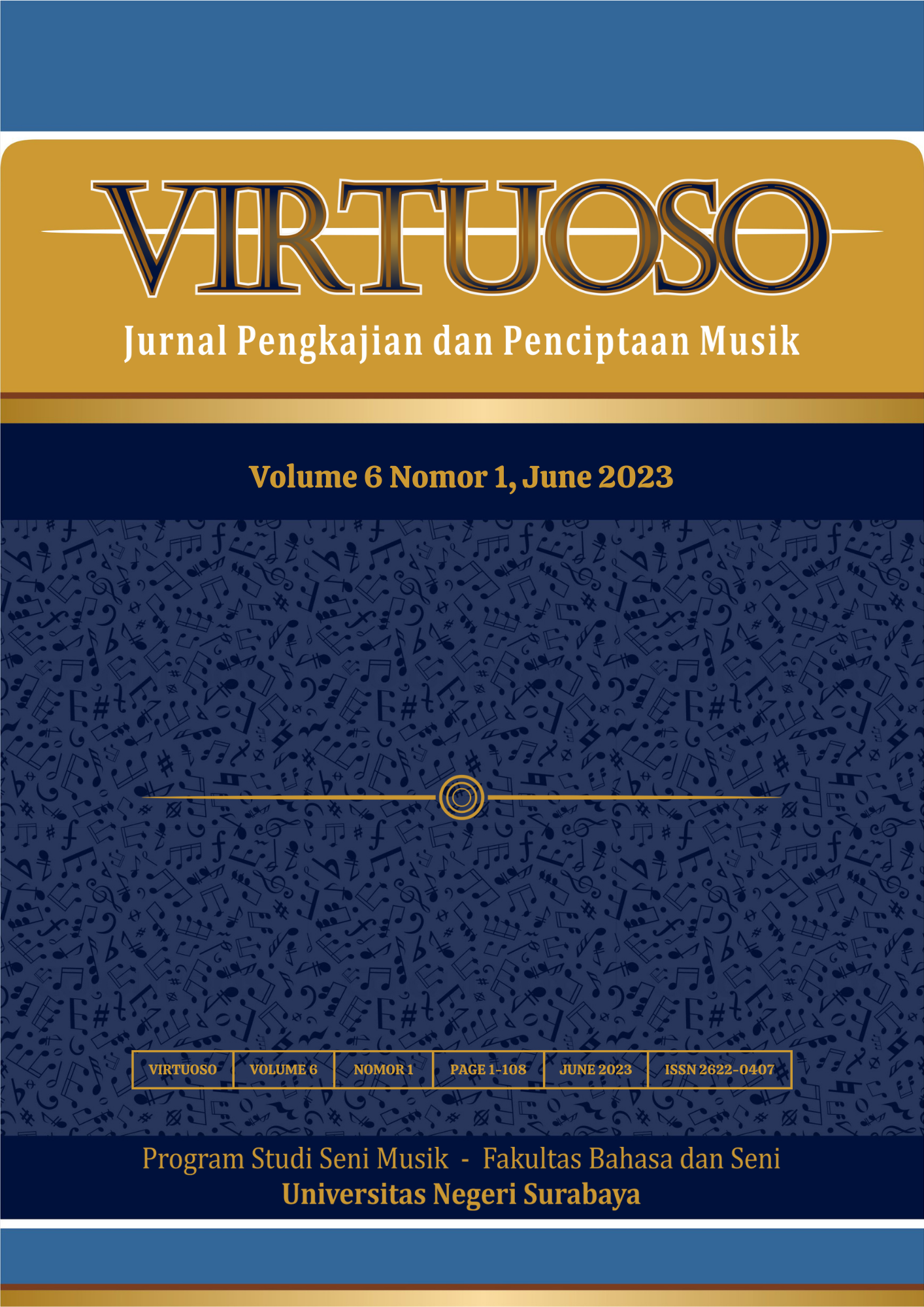Perspectives on Music Pedagogy in Informal, Performance-Based Learning
Main Article Content
Abstract
Music learning practices in formal settings, for example, in the classroom, generally apply structured and systematic curriculum-based learning strategies. The entire learning process has generally been organized and implemented with guidance and supervision by the teacher. In Indonesia, music learning in formal schools still applies the standardization of Western music theory. In fact, music learning practices that offer local pedagogical values provide a very diverse portrait. In higher education, music learning that applies local pedagogy has been going on for some time. The Music Education Study Program (PSPM) of Lampung University is one of the tertiary educational institutions that has implemented music learning practices based on local pedagogy. Learning practices that are also performance-based are carried out with "informal" stages and processes. This notion means that local pedagogy is based on informal music practices in Lampung society. Informal music learning practices have not been recognized as the curriculum of formal institutions. This article looks at the concept of Lampung local pedagogy applied in music performance-based learning practices in formal areas. The central theoretical perspective in this research uses Green's (2008) thoughts on informal learning in the classroom. Data were collected through observation and in-depth interviews with lecturers and students of levels 2 and 3. As a result, the concept of local music pedagogy that takes place in music performance-based learning at PSPM University of Lampung (1) provides opportunities for students to learn while creating; (2) provides space for collaboration and social participation; and (3) strengthens peer learning in groups.
Downloads
Article Details

This work is licensed under a Creative Commons Attribution-NonCommercial-ShareAlike 4.0 International License.
The copyright of the received article once accepted for publication shall be assigned to the journal as the publisher of the journal. The intended copyright includes the right to publish the article in various forms (including reprints). The journal maintains the publishing rights to the published articles.
References
Abril, C. R., & Gault, B. M. (Eds.). (2016). Teaching general music: Approaches, issues, and viewpoints. United States of America: Oxford University Press.
Burke, K. (1969). Rhetoric of motives. Berkeley: University of California Press.
Campbell, P. S. (2018). Music, education, and diversity. United States of America: Teachers College Press.
Campbell, Patricia Shehan, & Lum, C.-H. (2019). World music pedagogy: School-community intersections. New York: Routledge.
Denzin, N. K., & Lincoln, Y. S. (Eds.). (2018). The SAGE handbook of qualitative research (5th ed.). Los Angeles: SAGE Publications, Inc.
Finnegan, R. (1989). The hidden musicians: music: Making in an english town. Cambridge: Cambridge University Press.
Green, L. (2002). How popular musicians learn: A way ahead for music education. Aldershot, Hants ; Burlington, VT: Ashgate.
Green, L. (2008). Music, informal learning and the school: A new classroom pedagogy. Aldershot, Hampshire, England ; Burlington, VT: Ashgate.
Green, L. (2017). How popular musicians learn: A way ahead for music education. Aldershot, Hants ; Burlington, VT: Ashgate.
Herskovits, M. J. (1948). Man and his works: The science of cultural anthropology. United States of America: Alfred A. Knopf.
Hidayatullah, R. (2022). Tradisi musik orang Lampung. Penerbit BRIN. Jakarta: Penerbit BRIN. Retrieved 12 December 2022 from https://metatags.io/
Kolb, A., & Kolb, D. (2006). Learning styles and learning spaces: Enhancing experiential learning inhigher education. Cleveland, OH: CaseWestern Reserve University.
Merriam, A. P. (1964). The anthropology of music. Illinois: Northwestern University Press.
Rink, J., Gaunt, H., & Williamon, A. (Eds.). (2017). Studies in musical performance as creative practice Musicians in the Making: Pathways to creative performance. United States of America: Oxford University Press.

